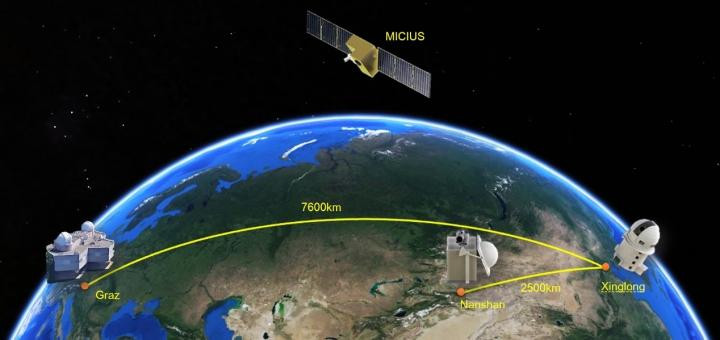Is China leading the race to create quantum internet? Massive quantum key network now online
China's quantum key network was used to transmit encrypted images across a distance of 7,600 kms – from Beijin to Vienna.

China's massive quantum key network is now live as researchers successfully sent quantum encrypted data – images and even a video stream – using the quantum satellite Micius. The new research could be the first step in achieving a completely unhackable and secure quantum internet.
Quantum communication involves the transmission of data in the form of quantum-entangled qubits (quantum bits). The process involves the sender keeping one of the qubits and sending the other qubit to the receiver. Quantum physics laws would make it impossible for the qubits to be intercepted without it alerting both sender and the receiver.
However, Quantum key distribution (QKD) ensures that the key of the data transmitted is completely secured. QKD uses single photons in quantum states to ensure that the data sent is secure even when being transmitted across vast distances.
According to the new research, published in the journal Physical Review Letters, quantum keys can also travel via satellite – sending encrypted data across thousands of kilometres.
Scientists at the Chinese Academy of Sciences led by physicist Jian-Wei Pan of the University of Science and Technology of China and scientists at the Austria Academy of Sciences were able to successfully transmit quantum encrypted photos across a distance of 7,600 kms – between Beijing and Vienna. The researchers even held a 75-minute long video conference that used only 2GB of data, using China's Micius satellite.
The quantum key distribution was achieved using the Micius satellite, which fuelled revolutionary research throughout 2017. Pan told LiveScience that the satellite is already ready to be used to encrypt even more information.
"Though the experiment is a prototype, I think it will revolutionise the existing communication system. The quantum computers will take some time, but the quantum communication is going to be a reality," C.M. Chandrashekar, at The Institute of Mathematical Sciences in Chennai, India told the Deccan Chronicle.






















